 Petzlover
Petzlover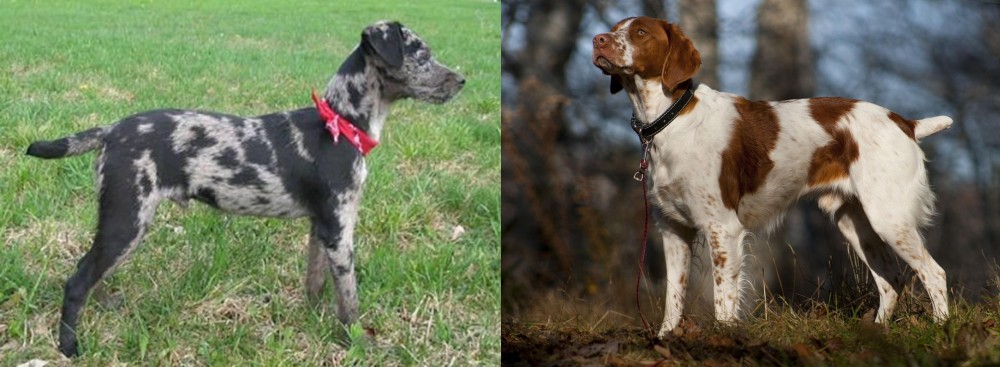 Atlas Terrier is originated from United States but Brittany is originated from France. Atlas Terrier may grow 24 cm / 9 inches shorter than Brittany. Atlas Terrier may weigh 14 kg / 30 pounds lesser than Brittany. Atlas Terrier may live 4 years more than Brittany. Atlas Terrier may have less litter size than Brittany. Atlas Terrier requires Moderate Maintenance. But Brittany requires Low Maintenance
Atlas Terrier is originated from United States but Brittany is originated from France. Atlas Terrier may grow 24 cm / 9 inches shorter than Brittany. Atlas Terrier may weigh 14 kg / 30 pounds lesser than Brittany. Atlas Terrier may live 4 years more than Brittany. Atlas Terrier may have less litter size than Brittany. Atlas Terrier requires Moderate Maintenance. But Brittany requires Low Maintenance
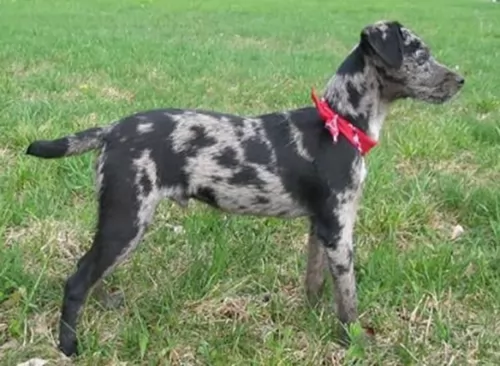 The Atlas Terrier is a rare dog. He was developed in the USA and is a blend of Jack Russell Terriers, Rat Terriers, Border Terriers and Patterdale Terriers. It was in 1990 that Lauren Wolfe developed a breed similar to the Jack Russell, but with a solid colour, and in fact she had two dogs that were solid red in colour. This was as a result of a cross between a Jack Russell Terrier and a Border Terrier.
The Atlas Terrier is a rare dog. He was developed in the USA and is a blend of Jack Russell Terriers, Rat Terriers, Border Terriers and Patterdale Terriers. It was in 1990 that Lauren Wolfe developed a breed similar to the Jack Russell, but with a solid colour, and in fact she had two dogs that were solid red in colour. This was as a result of a cross between a Jack Russell Terrier and a Border Terrier.
With the crossing of different terriers, the foundation for the Atlas Terrier was formed. Lauren Wolfe named the breed ‘Atlas Terrier’ because many terriers from various parts of the world were used to develop this specific breed. It was in 2001 that the Atlas Terrier Association was founded.
 One of the most intense bird dog breeds in existence is the Brittany, bred for hunt. The breed used to be called the Brittany Spaniel, but since the breed is closer to a setter or pointer, that moniker has been dropped. The Brittany is named for the French Province in which they were originally developed. Sometime from the 17th to the 19th centuries, the breed was developed. Images of a very similar dog can be found on 17th century paintings and tapestries. However, the first written description comes from 1850 by a Reverend Davies, describing a hunting episode. The breed was recognized officially in the early part of the 20th century and made a splash at the 1900 Paris Dog Show.
One of the most intense bird dog breeds in existence is the Brittany, bred for hunt. The breed used to be called the Brittany Spaniel, but since the breed is closer to a setter or pointer, that moniker has been dropped. The Brittany is named for the French Province in which they were originally developed. Sometime from the 17th to the 19th centuries, the breed was developed. Images of a very similar dog can be found on 17th century paintings and tapestries. However, the first written description comes from 1850 by a Reverend Davies, describing a hunting episode. The breed was recognized officially in the early part of the 20th century and made a splash at the 1900 Paris Dog Show.
The first official standards were written in about 1907 and the breed was recognized by the American Kennel Club (AKC) in 1934.The Brittany is expected to point to and then retrieve birds and other small ground game. Because the Brittany both points and retrieves they are known in the U.K. as a Hunt, Point and Retrieve breed or an HPR, and they have more Dual Champions than the rest of the AKC Sporting group.
There are actually two types of Brittanys in the minds of many breeders. There is the “French” Brittany and the “American” Brittany. When the breed arrived in the United States in 1931 they became immensely popular in a short period of time. In 1942 American Breeders began the American Brittany Club, rewriting the French standard to fit the dog they knew. Today there are definitely difference between the two sub-sets that can easily be seen. The French dog is smaller than the American dog. The American dog is a runner pacing ahead of the hunter while the French dog works more closely with their human companions. Another visible difference is that the French accept black spotted Brittanys, while in the United States a black spotted coat is considered a fault. Both sub-sets are known for their willingness to follow human directions, their eagerness for the hunt, and their agility and speed.
Unfortunately, the European wars took their toll on this breed as they did on many others. Following the second World War, their numbers in Europe were drastically reduced. The French had stop breeding them altogether during the war. It was in this depleted gene pool that the French agreed to accept the black spotted Brittany. Along with the U.S., Canada also does not recognize the black spotted Brittany.
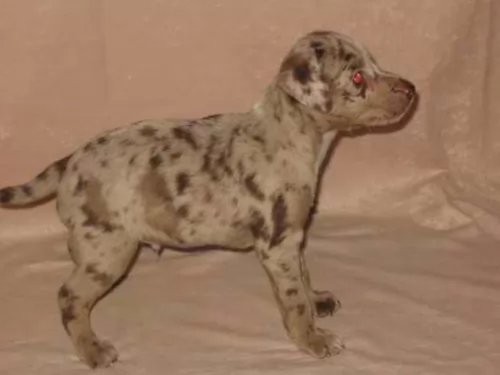 Atlas Terrier dogs are a small to medium sized dog but with a strong personality. With their two coat varieties – smooth and wire – and coming directly from the Jack Russell Terrier, this feisty dog suits those who want a low maintenance, fun breed who will join them on their walks or jogs. These dogs are brave and loyal and will double as a watch dog and family pet.The breed is accepted for registry and it is classified under the Terrier dog category.
Atlas Terrier dogs are a small to medium sized dog but with a strong personality. With their two coat varieties – smooth and wire – and coming directly from the Jack Russell Terrier, this feisty dog suits those who want a low maintenance, fun breed who will join them on their walks or jogs. These dogs are brave and loyal and will double as a watch dog and family pet.The breed is accepted for registry and it is classified under the Terrier dog category.
There are 3 sizes of Atlas Terrier – toy, miniature, and standard. The toy variety is 23 to 28 cm tall at the shoulder and weighs 2.7 to 5.4 kg. All three varieties are the same except for height and weight.
The coat of this dog is thick and may come in a variety of colours such as brindle or merle. The Atlas Terrier is also found in solid colours and sometimes you will find that they have white markings on the face, feet or chest. Most times the tail of the Atlas Terrier is docked, but if not, the tail curls over the back. The ears of the Atlas Terrier are V-shaped and they fold forward.
 The Brittany is much like other hunting dogs – pointers and retrievers – in size and stature. He is solid and strong but not heavy. He is compact with an average size head and floppy ears, docked tails or short natural tails, and expressively intelligent looking eyes. He is athletic, energetic, and alert. He has a long, elastic and free gait. The French dog is smaller and the dog with black spots is accepted. The American Brittany is larger and only a tri-color of orange, liver and white is acceptable.
The Brittany is much like other hunting dogs – pointers and retrievers – in size and stature. He is solid and strong but not heavy. He is compact with an average size head and floppy ears, docked tails or short natural tails, and expressively intelligent looking eyes. He is athletic, energetic, and alert. He has a long, elastic and free gait. The French dog is smaller and the dog with black spots is accepted. The American Brittany is larger and only a tri-color of orange, liver and white is acceptable.
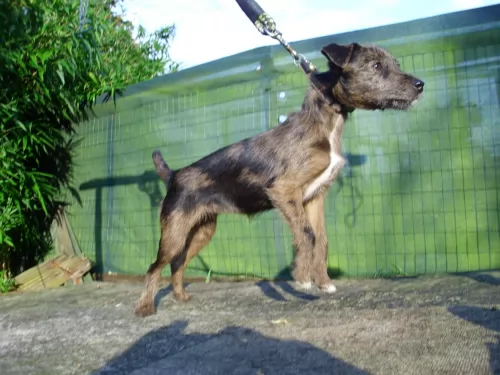 Atlas Terriers most certainly have a bit of the Jack Russell in them and these dogs are social, outgoing, mischievous and affectionate. They’re just like your regular naughty child and having one of them in your home will mean energy and lots of fun and games.
Atlas Terriers most certainly have a bit of the Jack Russell in them and these dogs are social, outgoing, mischievous and affectionate. They’re just like your regular naughty child and having one of them in your home will mean energy and lots of fun and games.
This is a highly social breed and he won’t like to be left alone every day. Just like a human child, he will need to be stimulated to ward off boredom and to prevent him from becoming destructive.
The Atlas Terrier just loves games and if you’re ready for a game, he will be more than ready to take part. He is intelligent and will therefore responds well to training and socialization. When properly socialized, Atlas Terriers get along well with children, and because they’re not an aggressive breed, if they’re properly trained and socialized they will get along with other pets too. Atlas Terriers make excellent pets, but he is a strong willed dog and will require an owner who is firm, but fair.
 The Brittany is particularly trainable and friendly. They love to play and are sweet-natured. They don’t due well with harsh correction though and a stern look will cause them to wither. Socialize them young or they can become shy around strangers. They are loyal and family oriented. They can easily become attached to their humans.
The Brittany is particularly trainable and friendly. They love to play and are sweet-natured. They don’t due well with harsh correction though and a stern look will cause them to wither. Socialize them young or they can become shy around strangers. They are loyal and family oriented. They can easily become attached to their humans.
 The selective breeding program of Atlas Terriers has meant that this is a robust, spunky breed free of any major health concerns. While they are a low maintenance breed with longevity on their side, you still have to be a responsible pet owner and see that your Atlas Terrier puppy gets all those must have injections.
The selective breeding program of Atlas Terriers has meant that this is a robust, spunky breed free of any major health concerns. While they are a low maintenance breed with longevity on their side, you still have to be a responsible pet owner and see that your Atlas Terrier puppy gets all those must have injections.
Tiny puppies are susceptible to infectious diseases and will have to be vaccinated against them from 8 weeks on and then also get an annual booster. The diseases to be vaccinated against include hepatitis, distemper, parvovirus, coronavirus, eptospirosis and parainfluenza. Vaccinations must be kept up to date and it is mandatory for your puppy to be vaccinated against rabies.
 The breed is a hardy one and Brittanys are mostly healthy dogs. In Europe 1 in 5 dogs dies of old age and that age is usually 14 or 15 years. They do have a few issues that they may be susceptible to. These would include:
The breed is a hardy one and Brittanys are mostly healthy dogs. In Europe 1 in 5 dogs dies of old age and that age is usually 14 or 15 years. They do have a few issues that they may be susceptible to. These would include:
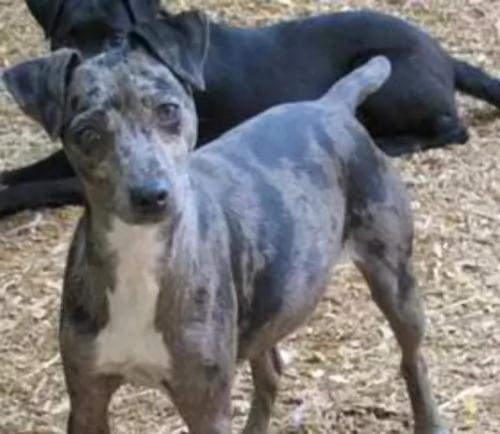 As a medium shedder, the Atlas Terrier will require some grooming. Grooming is easy and a brush twice a week with a rubber-bristled brush will remove those loose hairs and give his coat a sheen.
As a medium shedder, the Atlas Terrier will require some grooming. Grooming is easy and a brush twice a week with a rubber-bristled brush will remove those loose hairs and give his coat a sheen.
Always make sure you’re feeding your tiny puppy the right quantities of a food type. Always feed your puppy food which is appropriate to his age. Your 8 week old puppy will require 4 meals a day. A highly active breed such as the Atlas Terrier will require more protein for energy.
Speak to your veterinarian about the perfect diet for your puppy and about wet- or dry foods. There is the choice of feeding your puppy commercial dog food or your own home-prepared meals, but then you want to be sure that your puppy is getting the right balance of minerals and vitamins.
Once your Atlas Terrier is about a year of age, he can go onto one meal a day or a lighter meal in the morning and the evening. Remember to ensure that there is always clean, cool water available for your puppy.
 Don’t overfeed your Brittany. Keep him at hunting weight by feeding a half a cup up to 2 cups per day depending on the size of your dog and activity levels. Serve this in two meals not one.
Don’t overfeed your Brittany. Keep him at hunting weight by feeding a half a cup up to 2 cups per day depending on the size of your dog and activity levels. Serve this in two meals not one.
Ears – prone to infections – make sure that you check them and wipe them out routinely to prevent infections.
Hip Dysplasia – bones don’t fit well into joints – this can be genetic or otherwise, causing lameness and arthritis. If severe it can require surgery to correct.
Epilepsy – mild or serious seizures are possible. This can be genetic/hereditary but is set off by an infectious disease of the brain, head injury, poison, tumor, or metabolic disorder. There is no cure, but medication can be very effective.
Hypothyroidism – Low levels of thyroid hormone – can cause drooping eyelids, obesity, lethargy, mental difficulties or irregular heat cycles or all of this. Medication is available as it is for humans but must be taken daily for the rest of the dog’s life
Canine Discoid Lupus Erythematosus – autoimmune disease that is rare in dogs. Cats and humans can also have it. It is a skin disease and does not become the more serious and deadly Systemic Lupus. The Discoid version of this disease causes loss of pigmentation and a scaling on the nose which can then progress to the skin around the ears, eyes and genitals. There could be ulcerated lesions and tissue death in more severe cases. Sun exposure can make the condition worse.
The Brittany is a hunting dog that acts like a pointer but will retrieve fowl and birds in the water or on land. If you don’t hunt, the Brittany can still be your family dog. They need lots of exercise and mental stimulation. They need a job if they are not going to hunt and expect them to be distracted by every bird they see. Try flyball, agility, FAST CAT, field trials and dock diving. They are very task oriented and have boundless energy. They excel at obedience and confirmation as well.